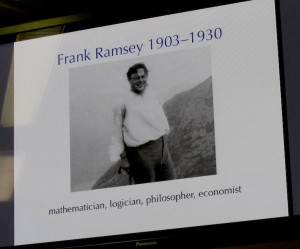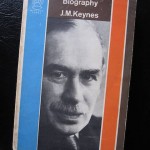Saturday dawned damp and overcast, as if November had arrived early. The wind had begun to strip the trees, carpeting the footpath with leaves. It seemed like a day for hunkering down with the newspapers and a good book. But then I remembered that it’s Cambridge’s annual ‘Festival of Ideas’ (the Humanities’ counterpart to the Science Festival of which I’m a Patron). The philosopher Hugh Mellor was billed to give a talk on Frank Ramsey in the University Library at 11am. So I got up and went to hear him.
Frank Ramsey is a Cambridge legend — a wunderkind who died tragically young at the age of 26, and yet made an indelible impression on those who had known him.
I first heard of him when I came to Emmanuel in 1968 and bought a battered copy of Keynes’s Essays in Biography in which there’s an essay on this prodigious mathematican-cum-philosopher-cum-economist. In it, Keynes laments the passing of his young protege and remembers
“His bulky Johnsonian frame, his spontaneous gurgling laugh, the simplicity of his feelings and reactions, half-alarming sometimes and occasionally almost cruel in their directness and literalness, his honesty of mind and heart, his modesty, and the amazing, easy efficiency of the intellectual machine which ground away behind his wide temples and broad, smiling face, have been taken from us at the height of their excellence and before their harvest of work and life could be gathered in.”
Ramsey published only two papers in economics (which was not his main field). They were published in the Economic Journal (of which Keynes was the editor). The first (published in 1927) was “A Contribution to the Theory of Taxation”; the other was “A Mathematical Theory of Saving,” published in December 1928. It addressed the problem of how much should a nation save, and was, wrote Keynes,
“one of the most remarkable contributions to mathematical economics ever made, both in respect of the intrinsic importance and difficulty of its subject, the power and elegance of the technical methods employed, and the clear purity of illumination with which the writer’s mind is felt by the reader to play about its subject”.
Professor Mellor’s talk (largely based on this biographical essay) was fascinating, liberally illustrated with sound clips from a radio profile of Ramsey that he had made with the BBC many years ago (and which is available from the Cambridge Dspace archive if you’re interested). I loved this clip, in which I.A. Richards remembers an early encounter with Ramsey as a teenager:
“Well, my old friend C. K. Ogden had a very queer place called ‘Top Hole’ – named after a war cartoon – above MacFisheries in Petty Cury, and one afternoon there, a tap on the door and in came this tall, ungainly, rather gangling boy. We knew who he was instantly – he looked so like his mother – and in no time almost he was at home. He was from Winchester where he’d been for some time with no one doing much more than saying ‘The library is yours, just do what you want’. He was recognised clearly at Winchester as quite one of the wonders; and there he was, and we chatted along for some time, and then he turned to Ogden and said: ‘Do you know, I’ve been thinking I ought to learn German. How do you learn German?’. Ogden leaped up instantly, rushed to the shelf, got him a very thorough German grammar – and a dictionary, Anglo-German dictionary – and then hunted on the shelves and found a very abstruse work in German – Mach’s Analysis of Sensations – and said: ‘You’re obviously interested in this, and all you do is to read the book. Use the grammar and use the dictionary and come and tell us what you think’. Believe it or not, within ten days, Frank was back saying that Mach had misstated this and that he ought to have developed that argument more fully, it wasn’t satisfactory. He’d learned to read German – not to speak it, but to read it – in almost hardly over a week.”
Four things stand out in my memory from Professor Mellor’s talk.
“Well, he’d had a very hard time with the Tractatus, and all sorts of people were called in, and didn’t like any version they could make of it. They couldn’t make it make as good sense in English as – if it made any good sense in German – they thought it should. [G.E.] Moore had been insisting very much that it wasn’t translatable – it would be much better left just as it was. After inventing a title – Moore’s title – one way and another it got into a kind of discard; and then I don’t know who suggested that Frank ought to have a try at it, and as soon as Frank and Wittgenstein got together over this it was clear that there was a possibility.”
The Tractatus impressed Ramsey enormously. He, like everyone else, found it exceedingly difficult, and he took immense trouble to try and understand it. In the autumn of 1923, after graduating from Trinity College as a Wrangler – i.e. with a First in Part II of the Mathematics Tripos – he went to Austria to visit Wittgenstein, who was then living in a small village outside Vienna. In a letter home, Ramsey gave a vivid picture of Wittgenstein’s life and of the intensity of their conversations.
“Wittgenstein is a teacher in the village school. He is very poor, at least he lives very economically. He has one tiny room, whitewashed, containing a bed, washstand, small table and one hard chair and that is all there is room for. His evening meal which I shared last night is rather unpleasant coarse bread, butter and cocoa. His school hours are eight to twelve or one and he seems to be free all the afternoon. He is prepared to give four or five hours a day to explaining his book. I have had two days and got through seven out of eighty pages. He has already answered my chief difficulty which I have puzzled over for a year and given up in despair myself and decided he had not seen. It’s terrible when he says ‘Is that clear?’ and I say ‘No’ and he says ‘Damn, it’s horrid to go through all that again’.”
Thirdly, I hadn’t known is that Ramsey had done pioneering work in the philosophy of science, in particular on the nature of theories. His view was that any scientific theory has to be reducible to a single (perhaps very long) sentence. The Cambridge philosopher Richard Braithwaite described it thus:
“Ramsey produced therefore a very interesting view of how to consider these theoretical concepts. … it wasn’t the case that the sentences about electrons and protons and so on were to be translated directly into propositions about observables. These terms played their part in extremely complex sentences – in a form which were twenty years later called Ramsey sentences – which had both them and observables in as well. So that a treatise of physics would really be one big long sentence – it would be rather like a fairy story starting ‘Once upon a time there was a man who …’ or ‘Once upon a time there was a frog which …’, the rest of the story going on to describe the adventures of the man or the adventures of the frog. A treatise on electrons, in Ramsey’s view, starts by saying ‘There are things which we will call electrons which …’, and then goes on with the story about the electrons … only of course you then believe the whole thing, the whole ‘There is …’ sentence, whereas in a fairy story of course you don’t.”
What’s really interesting, though, is what Ramsey was able to infer from this view of theories. He contended that “no single bit of a scientific theory can be understood apart from that theory; and bits of rival theories can’t be dismissed just because they don’t occur in our theory”. Thus, “The adherents of two such theories could quite well dispute, although neither affirmed anything the other denied”. This insight, which is essentially a description of the way in which rival scientific paradigms can be ‘incommensurable’, lay buried for decades, until it surfaced in 1962 as a key idea in Thomas Kuhn’s book, The Structure of Scientific Revolutions. Kuhn’s picture of science as a process of ‘normal science’ conducted around an agreed theoretical paradigm punctuated by occasional ‘revolutions’ in which one paradigm is overthrown by a newer one contained a shocking conjecture: because rival paradigms are ‘incommensurable’ — i.e. there exists no neutral language or conceptual structure in which the merits of the rivals can objectively be assessed — then essentially progress in science depends on non-rational factors. Or, to put it crudely, scientific progress depends on occasional bouts of what one critic called “mob psychology”. This offended many people — notably Karl Popper — but I don’t think anyone has really refuted it. The intriguing thing for me was the discovery that essentially the idea goes back to Frank Ramsey in 1920s Cambridge.
Finally, I discovered that Ramsey’s wife was Lettice Ramsey — the ‘Ramsey’ in Ramsey & Muspratt, the photographic studio in Post Office Terrace which photographed most Cambridge and Oxford academics for the best part of a century and which was demolished to make way for the Grand Arcade shopping mall. The firm’s archive has, it seems, gone to the Cambridgeshire Collection in the City library.
I’m on my way.



